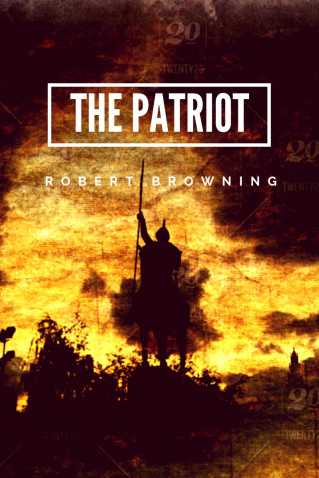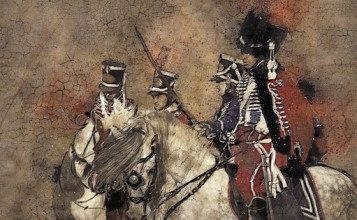
The Patriot: Summary
Written in ababa rhyme scheme, The Patriot is a dramatic monologue in which the narrator, a patriot of his country is being sentenced to death. He recounts what had taken place on the very day, exactly a year ago. The people had staged a grand celebration and welcomed the hero with great gusto and fanfare. His reception had been so resounding, so complete, that had he asked the public to present him the sun, the people would’ve asked him to ask for more. *Wow*
However, it was he who gave his all to his “loving friends”. The result: he is being convicted and sent to the gallows exactly after a year has passed. Sadly, there is nobody to welcome him anymore. The housetops are empty. Only a “palsied few” linger near their windows and the place is completely deserted. This is because most have already left to watch him being executed.
We soon find the helpless patriot moving along in the rain. His wrists have been bruised by the rope which is used to tie him up. A crowd starts throwing stones at him and he feels his forehead bleed. Finally, towards the very moment of his execution, he hopes that God will give him a fair judgement than these people.
The fickleness of public opinion is vividly demonstrated in this poem which highlights the fleeting nature of glory and greatness. The “patriot” learns this the hard way. The only saving grace the speaker has is the expectation that God will understand his condition and shall judge him in a more favorable light than the crowd has.
A short note on Browning’s use of dramatic monologue .
Browning is a master of a particular form of poetry known as the Dramatic Monologue.The narrators of Browning’s poems are highly multidimensional figures, with complex personalities and motives. Much is left unsaid in his dramatic monologues and oftentimes, the reader has to infer by the little that has been implied. Browning says much by saying little, like effective poets do . He paints his pictures through short, deft strokes and refrains from indulging in lavish and unwarranted verbosity, quite unlike the sentence you just read. In Browning, we are dealing with a poet who has a knack for providing a faint glimpse of the psychological built of the narrator of his poems. The “drama” in his dramatic monologues is the internal drama of the mind of his narrators rather than an external one. This is often visible in his poems like My Last Duchess, Fra Lippo Lipi and Porphyria’s Lover where the monologue of his narrators often reveal who they are more than what they are narrating. His monologues often begin with a certain directness which places the reader right in the middle of a situation. He doesn’t solicit your attention. He grabs you by the collar and places you right in the middle of a narrative, whether you like it or not. His dramatic monologues also showcase a brilliant use of a highly sensory language, of which The Patriot is a fine example.
Got No Time? Check out our Facebook Page for Quick Revision by clicking on the link below
https://m.facebook.com/Litbug.co/photos/a.353106305495706/877123799760618/?type=3&source=48
The Patriot: Analysis
The Patriot | Stanza 1
It was roses, roses, all the way,
With myrtle mixed in my path like mad:
The house-roofs seemed to heave and sway,
The church-spires flamed, such flags they had,
A year ago on this very day.
The poem opens with a highly sensory language which is maintained throughout the first and second stanzas. We are told that the people had showered roses all along the path as a gesture of celebration. They had strewn the paths with roses, adorned the church spires with flags and clambered atop house roofs and walls that it seemed to come alive with their cries.
The reader’s sense of sight, smell and hearing is instantly captured through the use of roses, the smell of the myrtle and the ringing of the church bells. The first stanza drowns the senses with a combined use of visual, olfactory and aural imagery.
The alliteration in the second line heightens the intensity of the smell of the myrtles that were used to welcome the patriot :With myrtles mixed in my path like mad.
This is where the reader must be careful. As with most of Browning’s dramatic monologues, The Patriot is also a highly ambiguous poem and this ambiguity is not only present in the structure of the poem but also in its content. Indeed, the very symbols used in the poem are ambiguous. True, the crowd celebrated the hero a year ago but as we have seen, the nature of that celebration was quite questionable. It was a celebration bordering on adoration and delirium. Similarly, the symbolic significance of the flowers mentioned in the opening lines is also marked by a degree of ambivalence. Roses have commanded multiple cultural references. Red and white roses are associated with Aphrodite, the Greek Goddess of love and beauty. In Christianity, it represents the idea of martyrdom. Myrtle, also associated with Aphrodite, is a flowering plant with lovely fragrance but bitter taste: it smells good but tastes bad, quite like the crowd’s behavior towards the patriot who is initially given a grand reception only to be sent for execution a year later.
As we’ve noticed, there’s something faintly sinister in the celebration of the crowd. The sight of the path strewn all over with roses , the intense smell of the myrtle, the rooftops that seem to heave and sway under the weight of the crowd and the church spires that seem to be in flames due to the flashing flags – all point towards an element of excess. Furthermore, the the use of the word “mad” conveys a sense of mad frenzy which has infected the whole rambunctious crowd.
The Patriot | Stanza 2
The air broke into a mist with bells,
The old walls rocked with the crowd and cries.
Had I said, “Good folk, mere noise repels—
But give me your sun from yonder skies!”
They had answered “And afterward, what else?”
The second stanza extends the aural imagery with the ringing of the bells that break the air into a mist with a force that borders on violence. The second line uses a powerful combination of alliteration and personification:
“The old walls rocked with crowd and cries.”
The inanimate object (wall) suddenly seems to have a will of its own, it suddenly seems sentient and rocks violently. The alliteration provided by the use of crowd and cries lends a dramatic intensity to the scene.
This collective delirium masked as a deliberated celebration is so intense that had the narrator wished to possess the sun, the public would’ve asked him to ask for something more. The quick response of the crowd to his outrageous demand (he’s asking for the Sun for God’s sake ) with a plea to ask for more betrays the thoughtless nature of their action. The crowd in this poem, like crowds in general does not think and a crowd that does not think is a potentially dangerous and thoughtless body that can do the unthinkable. In retrospect, the narrator’s remark “Good folk, mere noise repels” shows their celebration was just that- mere noise.
The Patriot | Stanza 3
Alack! It was I who leaped at the sun
To give it my loving friends to keep!
Naught man could do, have I left undone :
And you see my harvest, what I reap
This very day, now a year is run.
The third stanza brings to light the fact that it was the narrator who “leaped at the sun” to give it to his “loving friends”.
The first word of the stanza Alack! draws the reader’s attention to the pathos in which the speaker is recounting his decision.
Leaping at the run refers to the risk he has taken and the sacrifice he has made to give his best for his people. The leaping at the sun could also allude to the Greek myth of Icarus, Daedalus’ son with wax wings who, despite his father’s instructions flew too close to the sun. However, as he gets near the sun, his waxed wings melt, leading to a great fall in which he dies.
In the patriot’s case however, the narrator (according to his version) leaped at the sun not due to an overarching ambition but for the sake and in the service of his “loving friends”. But the harvest he reaps is not only that of ungratefulness and rejection by the public but a positive, malevolent celebration at his tragedy. This harvest completes a full cycle on the very day he was glorified a year ago.
The Patriot | Stanza 4
There’s nobody on the house-tops now—
Just a palsied few at the windows set;
For the best of the sight is, all allow,
At the Shambles’ Gate— or, better yet,
By the very scaffold’s foot, I trow.
The fourth stanza describes the present scene in which the lonely patriot finds himself in a deserted place. The house-tops are empty and the only ones who are present are the sick who cannot go where the frenzied crowd has gone- to relish the sight of him being executed. Some would want to be at the very foot of the scaffold so as to get a better view of the chopped head! (VIP seats anyone?).
The Patriot | Stanza 5
I go in the rain, and, more than needs,
A rope cuts both my wrists behind;
And I think, by the feel, my forehead bleeds,
For they fling, whoever has a mind,
Stones at me for my year’s misdeeds.
The patriot trudges along in the rain (Browning’s love for pathetic fallacy). His wrists hurt due to the rope with which he’s been tied. And the sadist crowd comes up with the bright idea of throwing stones at this poor man when his wrists are tied! On the forehead! Life’s not fair. Especially if you are a patriot.
The Patriot | Stanza 6
Thus I entered, and thus I go!
In triumphs, people have dropped down dead.
Paid by the world, what does thou owe
“Me?”— God might question; now instead,
‘Tis God shall repay: I am safer so.
The last stanza describes the futility of public glory and life in general. The “patriot” reiterates the classic lines as he says “Thus I entred and thus I go”.
He acknowledges that public opinion has always been unfair to great men and that they have found their worst defeats in their greatest victories. The injustice meted out to great men who have been paid by the world for their deeds in the most unfair terms is highlighted by the alliteration : In triumphs, people have dropped down dead.
The narrator ends his hope-less monologue on a note of hope that God will judge him better for all that he’s been through.
The Patriot is a scathing critique of the nature of public opinion and the fickleness of the general public. The poem almost absolves the narrator of his (literally untold) misdeeds and very cleverly highlights the rabid fever that the public has contracted. This vindication is corroborated by the fact that the “patriot” turns towards God for a fair judgement of his deeds without any guilt and remorse.
Titled The Patriot – an old story, the poem also seems to echo a very old story. If one closely looks at the manner in which the patriot is welcomed and the way he is subsequently insulted and his death celebrated, one might find it strikingly similar to the manner in which Jesus was welcomed on “Palm Sunday” (with the streets strewn with palm leaves and not roses in his case ) and how he was later denounced and finally crucified.
The reader may tend to empathise with the patriot and his situation, especially because he seems to be accepting his fate with a clean conscience. However, drawing this conclusion isn’t as easy as it seems. This is where the intent of the dramatic monologue comes to play. Most of Browning’s dramatic monologues are a defense provided by the speakers who are actually flawed: poems like My Last Duchess, Porphyria’s Lover among others present us with speakers who attempt a self-justification of their actions. We only get to see one side of the argument by virtue of its being a monologue. In such cases, it is the silences that help us infer the actual face of the speaker behind the mask of a monologue. It is very difficult to take the words of the patriot at face-value as we are only being told about his unjust treatment as he sees it. For all we know, the patriot might have leaped at the sun due to his own personal ambition. Similarly, the last lines of the patriot and his confidence in his actions , to the extent of feeling ‘safer’ under God’s judgement may either be an ironic statement or a delusional claim.
The Patriot as a poem mounts a critique against the ephemeral nature of public opinion. Browning, by shrouding the poem in ambiguity also makes one question one’s assumptions and allows one to accept different possibilities within a given situation which most of his dramatic monologues are adept in achieving.
The Patriot : About the author
The master of the dramatic monologue, Robert Browning is regarded as one of the greatest poet of Victorian Period. Born on 7th May 1812 in Camberwell, England to a well-off family, Browning seems to have been too cool for school and was educated at home, thanks to his supportive parents and his father’s huge private library. He had become proficient in Latin, Greek and French by the time he was fourteen and went to the University of London in 1828, only to leave after half a session. (Still too cool for school). His first published work Pauline received mixed responses, being admired by Dante Gabriel Rossetti and dismissed by John Stuart Mill. His next major work, Sordello was dismissed by everybody. Everybody found it too obscure to read and Tennyson is reported to have said the he could only make sense of the first and the last lines of the poem. *Burn*.
Burns aside, he met Elizabeth Barrett Browning in 1845, the two started writing to each other, a romance flowered and naturally, they married in secret before moving to Italy against the wishes of Elizabeth’s dominating dad who didn’t approve of the marriage. A son was born to the couple and they lived happily ever after until the unfortunate death of Elizabeth in 1861. Browning then moved to England and became involved in the literary circles. His reputation was restored by works like Bells and Pomegranates, Men and Women and The Ring and the Book. Poems like My Last Duchess Porphyria’s Lover and Pied Piper of Hamlin are taken from Bells and Pomegranates.
Browning died on 12th December 1889. He is buried in Poet’s Corner in Westminster Abbey next to his friend and rival, Alfred Tennyson.





Wish! This is some top-notch analysis of the Patriot. You guys are doing a great job 👍
Thank you
SATANZA 4 ………..
Some would want to be at the very foot of the scaffold so as to get a better view of the chopped head! (VIP seats anyone?).
✋
????Can I get one seat in the front row ????